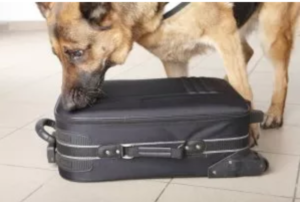 A Colorado man was arrested in Nebraska in mid-May after police stopped him for following another vehicle too closely. An investigation of the man’s minivan found 37 pounds of marijuana stuffed into the air compressor. Incidents like this one have led to lawsuits against the state of Colorado by Nebraska and Oklahoma, where our neighbor states have asked the U.S. Supreme Court to strike down legal marijuana. According to the lawsuits, our marijuana laws are straining the criminal justice systems of bordering states.
So, in light of stories like this one, we’d like to remind our readers about some of the limits of our legal marijuana laws.
Possession Limits and Crossing Borders with Marijuana
You won’t usually be charged if a cop finds marijuana in your car in Colorado, as long as it is in a sealed container and is not accessible. That does not mean you can drive into another state with marijuana in your car, even in a sealed container. Once you cross state lines, the rules of the new state apply. Transporting marijuana across state lines could open a whole different can of worms and could result in federal charges.
In terms of how much marijuana you are allowed to carry, the man in the above story went way over the line. You are allowed to possess up to one ounce of marijuana. There are 16 ounces in a pound, so our interstate weed baron from the above story was carrying almost 600 times the legal amount. In Colorado, possessing more than eight ounces of weed implies intent to distribute, which can increase your sentence; possession of more than 12 ounces is a felony and can land you in prison and carry hefty fines. Check out our marijuana FAQs for more information.
DUI Matters – Denver Drunk Driving Lawyers
Source: http://www.denverpost.com/news/ci_28122955/officials-colorado-man-stopped-nebraska-had-37-pounds
A Colorado man was arrested in Nebraska in mid-May after police stopped him for following another vehicle too closely. An investigation of the man’s minivan found 37 pounds of marijuana stuffed into the air compressor. Incidents like this one have led to lawsuits against the state of Colorado by Nebraska and Oklahoma, where our neighbor states have asked the U.S. Supreme Court to strike down legal marijuana. According to the lawsuits, our marijuana laws are straining the criminal justice systems of bordering states.
So, in light of stories like this one, we’d like to remind our readers about some of the limits of our legal marijuana laws.
Possession Limits and Crossing Borders with Marijuana
You won’t usually be charged if a cop finds marijuana in your car in Colorado, as long as it is in a sealed container and is not accessible. That does not mean you can drive into another state with marijuana in your car, even in a sealed container. Once you cross state lines, the rules of the new state apply. Transporting marijuana across state lines could open a whole different can of worms and could result in federal charges.
In terms of how much marijuana you are allowed to carry, the man in the above story went way over the line. You are allowed to possess up to one ounce of marijuana. There are 16 ounces in a pound, so our interstate weed baron from the above story was carrying almost 600 times the legal amount. In Colorado, possessing more than eight ounces of weed implies intent to distribute, which can increase your sentence; possession of more than 12 ounces is a felony and can land you in prison and carry hefty fines. Check out our marijuana FAQs for more information.
DUI Matters – Denver Drunk Driving Lawyers
Source: http://www.denverpost.com/news/ci_28122955/officials-colorado-man-stopped-nebraska-had-37-pounds Colorado Man Arrested in Nebraska with 37 Pounds of Marijuana

A Colorado man was arrested in Nebraska in mid-May after police stopped him for following another vehicle too closely. An investigation of the man’s minivan found 37 pounds of marijuana stuffed into the air compressor. Incidents like this one have led to lawsuits against the state of Colorado by Nebraska and Oklahoma, where our neighbor states have asked the U.S. Supreme Court to strike down legal marijuana. According to the lawsuits, our marijuana laws are straining the criminal justice systems of bordering states.
So, in light of stories like this one, we’d like to remind our readers about some of the limits of our legal marijuana laws.
Possession Limits and Crossing Borders with Marijuana
You won’t usually be charged if a cop finds marijuana in your car in Colorado, as long as it is in a sealed container and is not accessible. That does not mean you can drive into another state with marijuana in your car, even in a sealed container. Once you cross state lines, the rules of the new state apply. Transporting marijuana across state lines could open a whole different can of worms and could result in federal charges.
In terms of how much marijuana you are allowed to carry, the man in the above story went way over the line. You are allowed to possess up to one ounce of marijuana. There are 16 ounces in a pound, so our interstate weed baron from the above story was carrying almost 600 times the legal amount. In Colorado, possessing more than eight ounces of weed implies intent to distribute, which can increase your sentence; possession of more than 12 ounces is a felony and can land you in prison and carry hefty fines. Check out our marijuana FAQs for more information.
Conclusion
In conclusion, the arrest of a Colorado man in Nebraska with 37 pounds of marijuana underscores the persistent challenges faced by law enforcement agencies in combating interstate drug trafficking. The case highlights the need for continued collaboration and information-sharing among states to address the complex nature of drug-related offenses. Instances like these also underscore the importance of legal professionals, such as those at Thomas & Ahnell, LLC, who play a crucial role in navigating the legal intricacies surrounding drug-related charges. As the legal system works to address and deter such activities, it becomes evident that a comprehensive and collaborative approach is essential to ensuring the safety and well-being of communities across state borders.
Do you have further questions or concerns? Call us or contact the attorneys at Thomas & Ahnell, LLC, and we will be happy to help.
